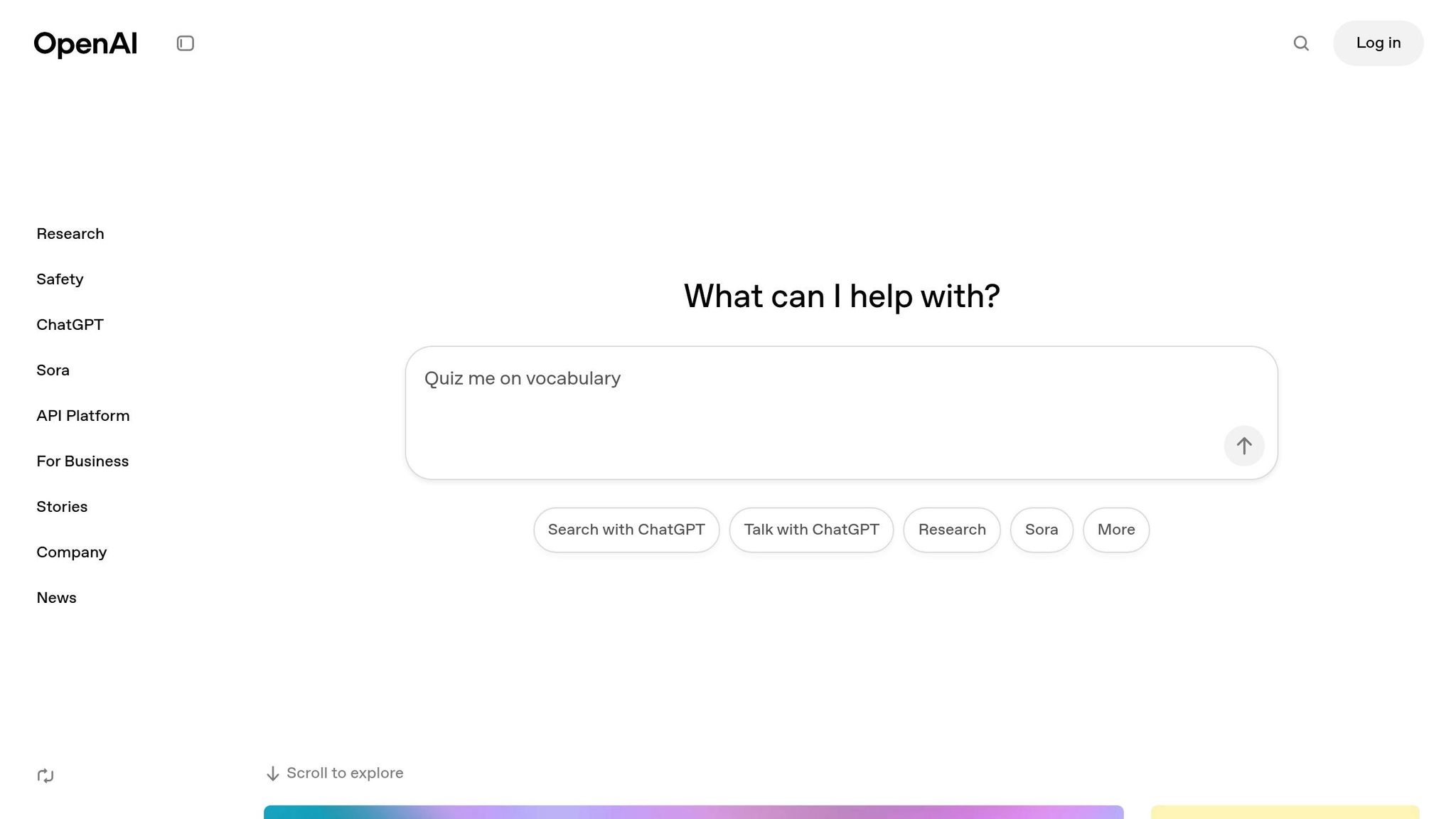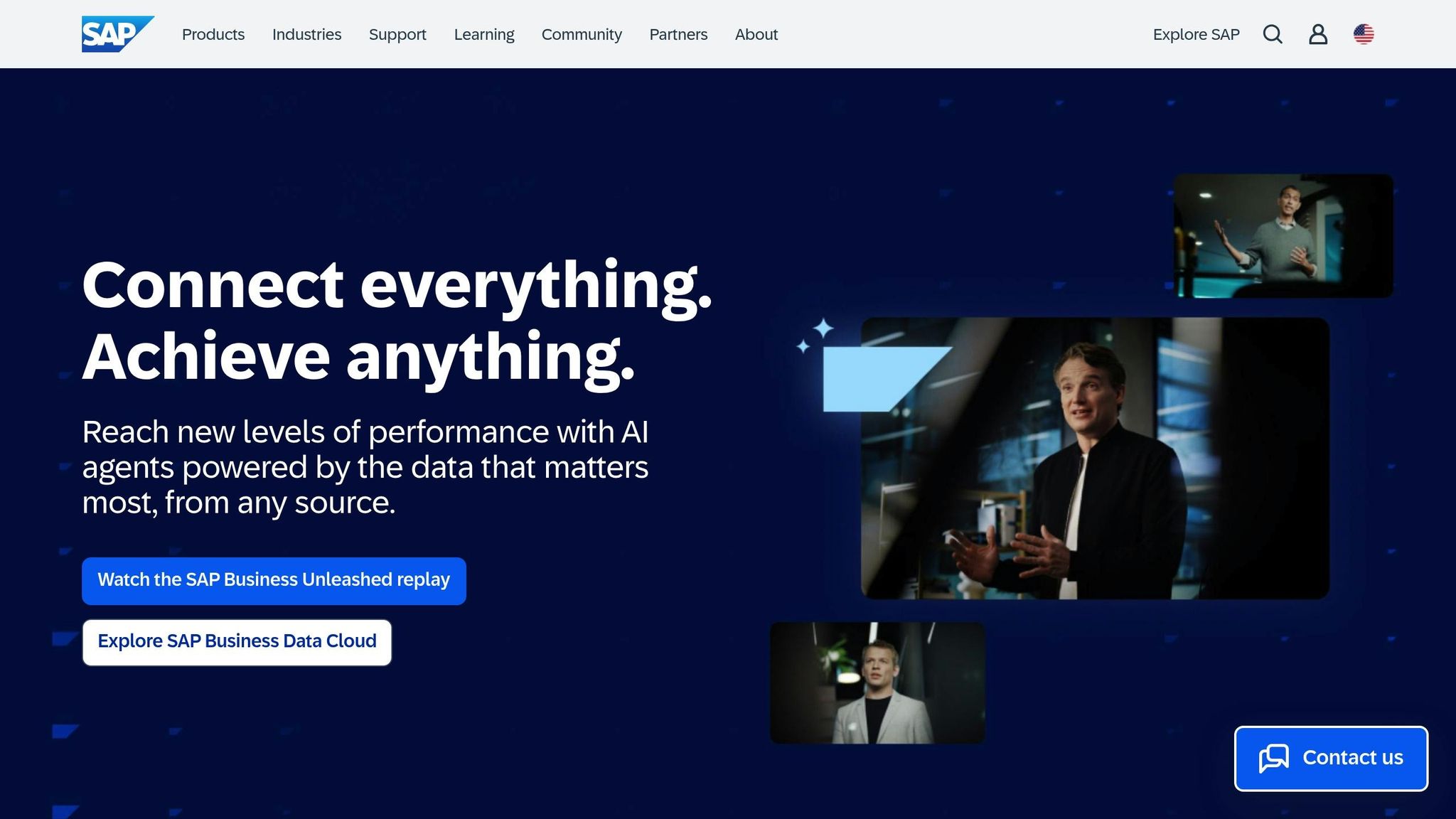Looking for the best AI agent software in 2025? Here’s a quick guide based on Reddit’s top picks. These platforms automate complex workflows, integrate with thousands of apps, and handle tasks with minimal human input. Whether you need customer support automation, data integration, or enterprise collaboration, there’s an AI agent for you.
Top AI Agent Platforms:
- OpenAI‘s Operator: Excels in natural language processing and workflow automation.
- Nvidia‘s Eureka Agent: Focuses on real-time task execution and data integration.
- SAP‘s Joule: Designed for enterprise collaboration and SAP ecosystem integration.
- Quidget: Specializes in customer support and sales automation with no-code setup.
Quick Comparison Table:
| Platform | Best For | Integration Options | Deployment | Starting Cost |
|---|---|---|---|---|
| OpenAI’s Operator | Workflow automation, data analysis | API-focused | Cloud-based | Usage-based |
| Nvidia’s Eureka | Real-time data tasks, research | Research tools | On-premise | Custom pricing |
| SAP’s Joule | Enterprise collaboration | SAP ecosystem | Hybrid | SAP license-based |
| Quidget | Customer support, sales | 6,000+ apps, multi-channel | Multi-channel | $16/month |
Key takeaway: For businesses seeking easy-to-use, affordable customer support solutions, Quidget stands out. For more complex workflows or enterprise needs, explore the other platforms.
AI Agents Explained: The Technology That’s Changing Everything (2025 Guide)
1. OpenAI‘s Operator

OpenAI’s Operator is designed to create and manage AI agents that streamline complex workflows using advanced language processing and data integration.
Key Features:
- Natural language processing for accurate task execution
- Connections to multiple data sources
- API integration with external tools
- Automation of intricate workflows
These features make it a go-to solution for tasks like customer support, data syncing, and workflow management. It’s especially useful for handling data analysis and automating business processes.
Operator’s ability to integrate with various tools and its language processing strength showcase how AI can simplify and speed up real-time business automation.
Top Use Cases:
- Automating customer support with intelligent, context-aware interactions
- Connecting tools like Google Sheets and Notion for smooth data sharing
- Coordinating complex workflows across different teams and systems
- Assisting with SEO writing and managing social media content
| Integration Type | Capabilities |
|---|---|
| Business Tools | API connections, workflow automation |
| Communication | Language processing, context handling |
Operator handles advanced tasks effectively, though some technical know-how may be required to unlock its full potential.
For companies prioritizing security, Operator supports integrations with secure data sources and can adhere to strict alignment protocols, depending on deployment needs.
2. Nvidia‘s Eureka Agent

Nvidia’s Eureka Agent is an AI platform built for handling tasks in real time. It focuses on executing tasks quickly, connecting with various data sources, and offering flexible API options.
Key Features
- Real-time task execution: Designed to handle tasks as they happen.
- Data integration: Works with a wide range of data sources.
- API connectivity: Offers flexible options for connecting with other tools.
Eureka Agent is built to scale and can handle everything from routine automation to more complex tasks. However, deployment requires some technical know-how, and specifics may vary depending on the setup.
| Aspect | Details |
|---|---|
| Primary Focus | Real-time task execution and data integration |
| Integration Options | API connections and support for external tools |
| Deployment Model | Flexible, with varying deployment details |
| Use Cases | Automating complex tasks and improving workflows |
The platform’s API supports multiple integration methods, making it compatible with tools like data processors, analytics platforms, business intelligence systems, and external databases.
Pricing information isn’t publicly available. Organizations interested in the platform should reach out to Nvidia directly, as costs may vary based on usage and service needs. Be sure to assess your technical requirements and intended use cases before moving forward.
3. SAP‘s Joule Collaborative AI Agents

SAP’s Joule is an AI platform designed to bridge traditional enterprise software with advanced AI tools. It focuses on helping businesses handle collaborative tasks across different units.
Key Features
| Feature | Description |
|---|---|
| Multi-Agent Collaboration | Allows multiple AI agents to work together on complex tasks |
| Documentation Generation | Creates detailed documentation automatically |
| Enterprise Integration | Seamlessly connects with tools in the SAP ecosystem |
| API Support | Provides flexible APIs for custom implementations |
Joule stands out for its focus on enterprise collaboration. However, compared to platforms like OpenAI’s Operator or Nvidia’s Eureka, detailed insights into Joule’s performance and implementation are still developing.
Integration Capabilities
Joule works within the SAP ecosystem using flexible APIs, making it adaptable to various infrastructure setups. The integration process will depend on your current system configuration.
Cost Structure
SAP hasn’t disclosed specific pricing for Joule. Costs are influenced by factors like usage, service level, task complexity, and deployment scope. Interested businesses should reach out to SAP for tailored pricing and deployment details.
Practical Considerations
For organizations considering Joule, it’s important to evaluate the following:
- Compatibility with your current SAP infrastructure
- Integration needs and technical requirements
- Your team’s familiarity with SAP tools and systems
As more businesses adopt Joule, its effectiveness will become clearer. For now, its seamless fit within the SAP ecosystem makes it an appealing option for existing SAP users looking to enhance their workflows with AI.
sbb-itb-58cc2bf
4. Quidget – AI Agent Builder for Customer Support & Sales
Quidget is a platform designed specifically for automating customer support and sales functions. Developed by SupportYourApp, a company with over 14 years of experience in customer service, Quidget brings industry knowledge into its AI agent solutions. Unlike broader platforms, it focuses on enhancing customer interactions through targeted automation.
Core Capabilities
| Feature | Description |
|---|---|
| AI Response System | Automates up to 80% of routine customer inquiries |
| Language Support | Operates in over 45 languages, enabling global usability |
| Integration Options | Connects with more than 6,000 apps, including Zendesk, Calendly, and CRMs |
| Deployment Flexibility | Functions on websites, apps, and messaging platforms like WhatsApp, Slack, and Telegram |
Technical Framework
Quidget uses a no-code approach, making it easy for non-technical teams to create AI agents. Its visual workflow builder simplifies setting up complex customer interaction patterns. Additionally, a web crawler feature enables AI training directly from your site’s content.
Practical Applications
Quidget’s AI agents are particularly effective in:
- Customer Support: Automating responses while allowing seamless handoffs to human agents.
- Sales Automation: Capturing and qualifying leads efficiently.
- Knowledge Management: Providing dynamic access to documentation and FAQs.
Cost Structure
Quidget offers pricing tiers to suit businesses of different sizes:
- Small Businesses: $16/month for 500 AI responses.
- Enterprises: $210/month for up to 50,000 AI responses.
Each tier includes varying levels of features and integration options.
Integration Experience
Quidget stands out for its direct integrations with customer-facing tools. It comes with pre-built connections to popular business platforms, ensuring smooth deployment and usability.
Performance Metrics
The platform tracks key performance indicators to measure AI agent effectiveness, including:
- Response accuracy
- Customer interaction times
- Resolution rates for queries
- Handoff rates to human agents
If your business prioritizes automating customer interactions, Quidget’s specialized focus makes it a strong contender. Up next, we’ll compare platforms to help you choose the best fit for your needs.
Direct Comparison
Here’s a quick breakdown of the main differences between these AI platforms:
| Feature | OpenAI’s Operator | Nvidia’s Eureka | SAP’s Joule | Quidget |
|---|---|---|---|---|
| Primary Focus | General-purpose AI automation | Scientific computing and research | Enterprise collaboration | Customer support and sales |
| Visual Builder | Limited | No | Yes | Yes |
| Language Support | 12 languages | Technical English only | 25+ languages | 45+ languages |
| Integration Capabilities | API-focused | Research tools | SAP ecosystem | Broad integrations |
| Deployment Options | Cloud-based | On-premise | Hybrid | Multi-channel |
| Cost Structure | Usage-based | Enterprise pricing | SAP license-based | Tiered plans starting at $16/month |
Technical Capabilities
This table highlights the technical strengths of each platform:
| Aspect | OpenAI’s Operator | Nvidia’s Eureka | SAP’s Joule | Quidget |
|---|---|---|---|---|
| Multi-Agent Collaboration | Advanced | Limited | Strong | Basic |
| Visual Workflow Builder | No | No | Yes | Yes |
| Supported Data Sources | Broad | Scientific datasets | Enterprise data | Website content, knowledge bases |
| Security Features | Enterprise-grade | Research-focused | SAP security standards | Business-grade |
Use Case Optimization
Different platforms shine in different areas. Here’s where each excels and where they might fall short:
| Platform | Best For | Less Suitable For |
|---|---|---|
| OpenAI’s Operator | Research teams, developers | Customer-facing operations |
| Nvidia’s Eureka | Scientific computing, ML research | General business automation |
| SAP’s Joule | Enterprise workflow automation | Small business operations |
| Quidget | Customer support automation | Complex research tasks |
Which AI Agent Should You Choose?
Choosing the right AI agent platform depends on your specific needs, technical know-how, and budget. For businesses looking to enhance customer support and sales without diving into complex technical setups, Quidget stands out. It’s designed with a clear focus on these areas, making it a strong contender among top AI platforms.
Quidget simplifies the process with its visual builder and ready-made templates, making deployment straightforward. Supporting over 45 languages and offering multi-channel options, it helps you connect with a global audience. Plus, it integrates smoothly with messaging apps like WhatsApp, Slack, and Telegram. Here’s how Quidget can align with your business goals:
- Limited Technical Resources: No IT team? No problem. Quidget’s user-friendly interface allows you to set up AI-powered customer interactions quickly and easily.
- Budget-Friendly Options: With a straightforward pricing structure, you can scale up as your business grows without a hefty initial cost.
- Tailored for Customer Service and Sales: Features like multi-channel deployment, extensive language support, and seamless integrations make Quidget a practical tool for improving customer interactions.
Your AI agent platform should align with your business’s specific goals and growth plans. Quidget’s design makes it a solid choice for businesses prioritizing customer engagement and streamlined operations.
FAQs
What is the difference between AI agent and chatbot?
AI agents and chatbots serve different purposes and use distinct technologies:
| Feature | AI Agents | Chatbots |
|---|---|---|
| Processing | Uses machine learning and deep learning | Relies on rule-based scripts |
| Decision Making | Operates autonomously with minimal guidance | Follows fixed conversation paths |
| Task Complexity | Manages complex, multi-step tasks | Handles basic Q&A and simple tasks |
| Learning Ability | Learns and improves over time | Static, based on pre-programmed rules |
| Integration | Connects with 6,000+ apps and tools | Limited to preset integrations |
For example, tools like MetaGPT simulate software development teams, enabling multi-agent collaboration to tackle complex tasks and integrate various APIs.
On the other hand, traditional chatbots stick to predefined scripts, making them ideal for straightforward customer service but less effective in dynamic or intricate scenarios.
If you need a system for complex workflows, broad integrations, and continuous learning, go for an AI agent. For simple, predictable interactions, a chatbot is the better choice. These distinctions help businesses pick the right solution for their needs.


